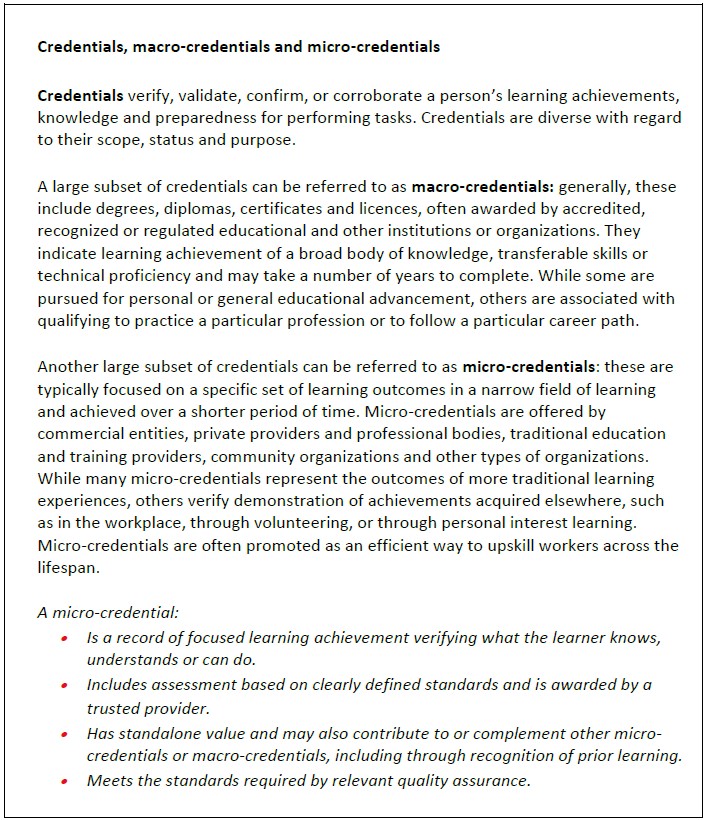The concept of the microcredential (MC) has taken on greater and greater prominence in recent years. Microcredentials are now being talked about in a range of different discussion fora and also from different perspectives, becoming something of a buzzword. Despite this, we are from from reaching a consensus about what the word means, what it should apply to, and how we should use it. Indeed, very often the word can be seen to be used somewhat carelessly, without real knowledge about what microcredentials are, adding to the confusion that sometimes surrounds them.
So, in this post, we would like to offer some insights into what the current thinking is with regard to the concept of microcredentials. But we know that, sooner rather than later, we will have to update this article because of the tremendous speed at which things are moving with regard to microcredentials, both in higher education and in the job market.
MICROCREDENTIALS: THE CURRENT STATE OF THE ART. November 2022.
Let’s take a quick walk through the most important recent milestones towards defining what microcredentials are. We’ll start with a broad view and then narrow as we go, beginning with the perspective on microcredentials at the highest international level and then focus in on the European view before centring in on Spain. Let’s do it.
The view from UNESCO
The most ambitious attempt to create an international consensus on the definition of a microcredential can be found in a report entitled Moving towards a common language on micro-credentials, published this year by UNESCO, although a draft was previously published in 2021. The report was written by the project leader Beverley Oliver.
It proposes definitions of credentials, macrocredentials and microcredentials, as can be seen below.

Europe
Turning now to the European context, let us now consider the proposed Recommendation published by the Council of the European Union in July 2022. (The two annexes in the same document are also of interest.)
“Micro-credentials certify the learning outcomes of short-term learning experiences, for example a short course or training. They offer a flexible, targeted way to help people develop the knowledge, skills and competences they need for their personal and professional development.”
European Union Recommendation proposal
The proposed EU Recommendation highlights the need to develop common standards for issues such as quality assurance, transparency, interoperability, and flexibility, in order to build public trust in microcredentials.
Spain
With regard to Spain, let us consider what the law says and the recommendations made by ANECA, Spain’s agency for quality assurance in higher education.
The only reference in Spanish law to microcredentials appears in Royal Decree 822/2021, regarding the organization of university study programmes and related quality assurance procedures:
Article 37. Lifelong learning
8. Universities can also develop their own institution-specific study programmes consisting of less than 15 ECTS credits, which may or may not require prior university study, in the form of microcredentials or micromodules, enabling the certification of learning outcomes associated with short courses. These programmes are not to be confused with those vocational training qualifications known as grado medio and grado superior de formación profesional.
Royal Decree 822/2021
So, microcredentials are associated here with lifelong learning programmes. We believe that this is due to the fact that the law is only beginning to respond to the new possibilities microcredentials open up – we think that new legislation will need to be introduced to reflect the fact that microcredentials are present in a wider range of educational settings. Yet, in July 2022, ANECA held a meeting with practically all the major stakeholders in education to present its position and recommendations with regard to microcredentials, and it also referred to them as a part of lifelong learning:
- Study on quality assurance with regard to “European Universities” partnerships, European qualifications and microcredentials in the Spanish university system.. Published in June 2022.
- Framework for the quality assurance of microcredentials published in July 2022, including measures to promote microcredentials as an approach to innovative, inclusive and coherent lifelong learning.
So, we can see that the authorities responsible for laying down public policy are now establishing the necessary frameworks in which to contextualize and implement microcredentials.
However, at this stage, microcredentials are still linked primarily to lifelong learning in Spain, and we believe is that their scope should be widened to include other educational settings. We recognize that it is imperative for today’s society’s to address their upskilling and reskilling needs, as made clear by UNESCO in 2020, but we feel that it is important not to lose sight of the opportunity that microcredentials present us with to instil real change in traditional educational models and approaches. We’ll talk about that again in another post.
One more thing
We didn’t really want to talk about the academic literature on microcredentials in this post… but an article has been published recently that we just have to mention. For one thing, it discusses the same issues we’ve been talking about here, and also the authors are important voices in the field: Mark Brown and Mairéad Nic-Giolla-Mhichil of the National Institute for Digital Learning at Dublin City University.
Mark Brown & Mairéad Nic-Giolla-Mhichil (2022): Unboxing micro-credentials: an inside, upside and downside view, Culture and Education, DOI:10.1080/11356405.2022.2102293
You can read the article here: https://www.tandfonline.com/doi/full/10.1080/11356405.2022.2102293


